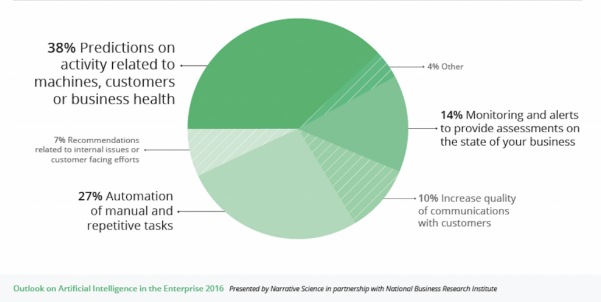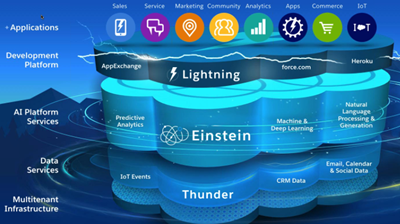Will Artificial Intelligence (AI) Take Over Content Marketing?
By Venus Tamturk
September 20, 2016
Artificial Intelligence, B2B Content Marketing, Business Intelligence, content marketing, Content Strategy, Digital Marketing, inbound marketing, marketing, Microsoft, Salesforce
Do you know that some of the content you read wasn't written by human beings? Automated Insights states, its software created one billion stories last year, many with no human intervention. This content you are reading was written by a real person, but just think, what are the chances you haven’t consumed that type of content without knowing it?
 So what does it mean for content marketing? Forbes contributor Jayson DeMers has a futuristic approach to that question: “Right now, human writers are available at a variety of expertise levels and costs, making it possible for any company to find a good fit for their own content needs. In the not-too-distant future, algorithms will outperform all of them, and at a far lower cost. Essentially, human writers will be completely out of the equation.”
So what does it mean for content marketing? Forbes contributor Jayson DeMers has a futuristic approach to that question: “Right now, human writers are available at a variety of expertise levels and costs, making it possible for any company to find a good fit for their own content needs. In the not-too-distant future, algorithms will outperform all of them, and at a far lower cost. Essentially, human writers will be completely out of the equation.”
A study conducted by Christer Clerwall of Karlstads University in Sweden was published in Journalism Practice, proving that most people are not able to tell the difference between content written by journalists and those generated by software. “Perhaps the most interesting result in the study is that there are [almost] no… significant differences in how the two texts are perceived,” Clerwall concluded. “An optimistic view would be that automated content will… allow reporters to focus on more qualified assignments, leaving the descriptive ‘recaps’ to the software.” Moreover, The New York Times published a short quiz with blurbs written by both humans and computers, asking readers if they could guess whether the piece was created by humans or computer algorithms. Here, you can take the quiz for yourself.
Gartner estimated that 20% of business content will be authored by machines by 2018. So can computers really eliminate human wordsmiths in the near future? The short answer is NO, as long as content marketers look at this as an opportunity, rather than a threat. For instance, a writer can not go through over 2 million blog posts created on a daily basis, but can leverage the technology to find out what keywords are used in successful content or what topics resonate best with their audience. After all, sharing personal experiences or powerful storytelling is not something that the Terminator would do. It takes human connection. Therefore, we should all conquer our exaggerated Hollywood-powered fears, and instead, decipher the ways we can get the most out of the technology’s intelligent predictions and actionable recommendations. In fact, many business executives are already aware of the opportunity. A survey of 235 business executives conducted by NBRI demonstrated the most important benefit seen with AI-powered solutions:

One of the fundamental components of content marketing and branding is a consistent voice and tone. I’m sure that her readers do not follow Ann Handley only because of the topics she chooses. In fact, she has many readers who wouldn’t even care what she writes about, because the way she conveys her messages is what matters the most. This type of consistent connection can’t be attained by artificial intelligence tools. However, they can save time for writers when it comes to researching the facts and analyzing demand.
Given that one of the most popular content types is in-depth interviews with thought leaders, the computer may pick up information but it doesn’t have critical thinking skills and the human touch that could assimilate feelings through on-point questions, and transform a conversation into a unique story.
Being informed is one thing, but getting a true insight is another. Content creators should definitely tap into this emerging technology and leverage it to ensure their content meets the most critical SEO rules, after all, content without access is worthless. However, the technology can’t connect the dots when it comes to a true insight through depth of experience. The best solution will always lie in the intersection between humans and technologies.
The point is this, it’s important to understand that the emotional storytelling and complex insights that come from real-life experience is still the domain of the human brain. But creating an ultimate, future-proof content and engagement with your audience also requires science.
The conference that was held at Dartmouth in 1956, is still considered the biggest groundbreaking event in the artificial intelligence field. Although it was believed that machines would be capable of using natural language, solving problems, simulating every aspect of learning and any other feature of intelligence within two decades, by the 1970’s, the period known as the AI winter had taken hold due to reduced funding and a lack of interest in artificial intelligence research. The enthusiasm around AI has cautiously grown since its low point in 1990, and in 2011, IBM’s Watson system beat the best human players in the game show Jeopardy! From there, it started to pick up the speed.
The Biggest Recent AI & Machine Learning Acquisitions
Since Google acquired Deep Mind, a little known deep learning startup from Cambridge in 2014 for £400 million, technology giants have geared up in the artificial intelligence (AI) race. In October 2015, Intel acquired a cognitive computing platform provider, Saffron, in a move to bolster the role of AI solutions. This deal was followed by the acquisition of Itseez, a computer vision and machine learning startup, in May 2016. “Itseez will help Intel’s customers create innovative deep-learning-based [computer vision] applications like autonomous driving, digital security and surveillance, and industrial application,” said Doug Davis, Intel Senior Vice President And General Manager, in Intel’s announcement. Finally, last month Intel announced that it acquired deep learning startup Nervana Systems for $350 million.
In February, Microsoft confirmed that it has acquired SwiftKey, which makes predictive keyboard software that learns users’ typing habits and adapts accordingly, for $250 million. This acquisition was followed by the acquisition of a messaging app developer, Wand Labs in June. The deal was part of Microsoft’s strategy for Conversation as a Platform, which Satya Nadella introduced at the Build 2016 conference in March. Lastly, in August, the company also signed an agreement to acquire Genee, an artificial-intelligence-powered scheduling service in an effort to integrate its smart assistant Cortana with Office 365 apps.
Apple has stayed in the AI startup buying party this year by purchasing two more machine learning startups. First, it bought a San-Diego based AI startup that uses artificial intelligence to read facial expressions in images. Then in August, they bought a Seattle-based startup Turi, which manufactures the machine learning platform for developers and data scientists, for $200 million.
After its acquisitions of machine learning startups Madbits in July 2014 and Whetlab in 2015, Twitter acquired the London-based startup Magic Pony Technology, which develops machine learning tools to provide expanded data for images, for £150 million in June.
 Most recently, Salesforce made the announcement that its new deep learning platform Einstein, would become the foundation of all of its future Software-as-a-Service offerings. To build Einstein, Salesforce splashed out about $650 million, acquiring dozens of artificial intelligence and machine-learning centric startups over the past two years. The CRM giant also quietly assembled a team of 175 data scientists, mostly through these acquisitions.
Most recently, Salesforce made the announcement that its new deep learning platform Einstein, would become the foundation of all of its future Software-as-a-Service offerings. To build Einstein, Salesforce splashed out about $650 million, acquiring dozens of artificial intelligence and machine-learning centric startups over the past two years. The CRM giant also quietly assembled a team of 175 data scientists, mostly through these acquisitions.
"Think of Einstein as the intelligence layer between the data and the actual apps," said John Ball, Senior Vice President and General Manager of Content for Salesforce. "The best AI is when the user doesn't necessarily notice it. We surface lead and opportunity insights, and we've baked AI throughout the platform and the user experience so that, over time, the user won't even think of it as an AI-powered feature; it's just part of the platform."
What is the Value?
Tech companies have been heavily investing in the machine learning and artificial intelligence space in order to bring predictive capabilities to their suites of products. Good for them! But will other companies see the value AI has for them? The giant tech companies have long overpromised what artificially intelligent machines can do, but can the value be easily seen in the beginning? “No one really knows where the value is,” says Marc Benioff, Co-Founder and Chief Executive of Salesforce. “I think I know — it’s in helping people do the things that people are good at, and turning more things over to machines.”
The basic idea behind this technology is benefiting people by examining the past and current consumer behavior, to then predict the future, in order to give insight on which area to focus on more or less. The main purpose is to provide new levels of productivity as businesses will be able to know which customers are most likely to purchase a particular product and the best way to engage, depending on buyers’ behaviors. To do so, enterprise software makers are in a cut-throat competition to bring predictive capabilities into their suites of products.
Artificial intelligence technology is not just something invented for billionaire Silicon Valley companies. Non-tech companies are utilizing accelerated AI solutions as well. In fact, the technology is primarily affecting industrial and mechanical industries by boosting productivity in mass production, but today all types of business are taking advantage of artificial intelligence in order to increase efficiency. Analyst Greg Maczka, for instance, commented on the impact of AI on the future of research: “AI will have a much greater impact on actual, real-life analysis which will eliminate the need to set up elaborate and unrealistic testing situations in the first place. And that'll be the future of market research.” Here are some other examples of how non-tech companies are capturing AI in their fields:
Insurer and finance company United Services Automobile Association (USAA) works with an AI product built by Intel’s Saffron. The platform matches patterns of consumer behavior, so the organization can predict how to reach out to customers specifically about what products they might be interested in. As a result, the organization can approach a prospect/customer through personalized and organized customer service. When you think about it, this is a win-win situation as the company reduces cost while consumers are encountering better experiences.
EasyJet has been utilizing predictive analytics in order to plan things like flight destinations to even the food and drink items they serve on their flights. “The difference between analytics and AI is that the former has been about diagnostic capability and looking backward, whereas the latter is focused on predictive capability, which can help organizations better understand and plan for the future,” said Alberto Ray-Villaverde, the Head of Data Science at EasyJet, in an interview.
Speaking of traveling, Airbnb is another organization that helps its customer via AI solutions in a very dynamic and creative way. Actually, the company has created its own in-house software tool that lets Airbnb hosts see exactly where they should set the price of their property on a day-by-day basis to make it most likely to be rented. Here’s how it works: If a host has it priced just right, those dates will show up green on the calendar — but if the price is too high, Airbnb Price Tips will show the price as red. So the host can get it right in the sweet spot by adjusting via a slider. In that way, they can arrange the price low enough that it'll likely be rented, but high enough that they’re not losing the opportunity to make more money while the market conditions keep changing.
In conclusion, artificial intelligence is not the future as it has been already for quite some time. However, it is gearing up in many industries as the companies try to figure out how to get things done in the most productive way by engaging with their audience more than ever, to generate traffic and leads. For the content marketing space, the situation is not much different. Just because algorithms are able to scout the web for information, compile it, and produce a full-length article doesn’t mean personal experience, sense of humor, critical thinking, creativity, a wealth of knowledge, and other components of humanity will lose their value. In my opinion, the best solution is to put aside the fears associated with AI for content marketing and consider the ways that we could incorporate the benefits of the technology into our content marketing strategies.

Venus Tamturk
Venus is the Media Reporter for CMS-Connected, with one of her tasks to write thorough articles by creating the most up-to-date and engaging content using B2B digital marketing. She enjoys increasing brand equity and conversion through the strategic use of social media channels and integrated media marketing plans.